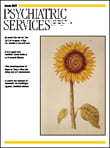Letter
The Evolution of the Consumer Movement
To the Editor: The essay "Evolution of the Antipsychiatry Movement Into Mental Health Consumerism" ( 1 ) in the June issue attempts to impose false labels and a skewed history on activists for human rights in mental health, including the nonprofit organization that I direct, MindFreedom International.
The origin of our social change movement cannot be traced to a few antipsychiatry theoreticians and campus intellectuals. Many of us actually credit the civil rights movement and our own experiences of psychiatric abuse as the original sources of our inspiration. We can and do organize on our own. The authors use the undefined term "antipsychiatry" 34 times in their essay, applying that label to many of us who do not describe ourselves or our groups in that way. There are, for example, compassionate, practicing psychiatrists who play an active role in MindFreedom.
The authors claim that psychiatry has addressed our key grievances "to some degree." Even if some psychiatrists have reduced the dosages of neuroleptics prescribed, overall neuroleptic prescriptions are skyrocketing. Neuroleptic prescriptions for youths have shot up more than fivefold in less than a decade ( 2 ). From our perspective, both electroshock and psychosurgery have experienced a resurgence in popularity within psychiatry and the mainstream press. Many states have greatly expanded commitment criteria, and most states have implemented involuntary outpatient commitment. Courts now order some MindFreedom members who live peacefully in their own homes to take neuroleptics involuntarily.
The authors appear to observe us from afar through a flawed lens, which may explain their factual errors. The well-respected activist Leonard Roy Frank is not the founder of Support Coalition International. Support Coalition International and MindFreedom International are not two separate organizations—our name change occurred in 2005. The essay aligns the history of our movement with the "radical left" to a great extent, ignoring decades of outstanding work by conservatives and libertarians in fighting psychiatric abuse. Today, conservatives lead the grassroots opposition to mental health screening in schools.
Consider the bias inherent in this sentence: "Psychiatry continues to fight antipsychiatry disinformation on the use of involuntary commitment, electroconvulsive therapy, stimulants and antidepressants among children, and neuroleptics among adults." The authors appear to transmogrify into "antipsychiatry disinformation" all public education efforts that are inconsistent with the American Psychiatric Association's official position.
This is my 30th year working for human rights and alternatives in the mental health system. We have made mistakes. We are not perfect. But I am very proud of our social change movement, which includes concerned family members, advocates, attorneys, mental health professionals, and interested members of the public. The authors claim that the psychiatric profession finds it difficult to communicate with us. The fact is that the American Psychiatric Association has generally refused our repeated invitations for conversation.
Somehow, some people who have experienced serious human rights violations in the mental health system—including unscientific labeling, forced drugging, solitary confinement, restraints, involuntary commitment, electroshock, and more—have reached deep within the human spirit and found the power to speak out and unite nonviolently ( 3 ). Please reply with dialogue, not distortion.
1. Rissmiller D, Rissmiller J: Evolution of the Antipsychiatry Movement Into Mental Health Consumerism. Psychiatric Services 57:863-866, 2006Google Scholar
2. Carey B: Use of antipsychotics by the young rose fivefold. New York Times, June 6, 2006, p A18Google Scholar
3. Mahler J, Unzicker R, Foner J, et al: Taking issue with taking issue: "psychiatric survivors" reconsidered. Psychiatric Services 48:601, 1997Google Scholar



